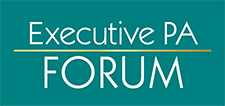You may be the kind of person who coaches others, or you may be the one who is more inclined to seek out coaching for your own development needs. In this article, we’ll take an inside look into coaching and how it can help executives and their assistants excel in the workplace. If you have ever considered coaching but are unsure what the benefits will be for you, read on as we aim to answer all your questions.
When researching for this article, we noted how much overlap there is between the topics discussed by Adam Fidler and Trish Butera at the Executive PA Forum 2020. Adam’s insights regarding building new and future proofed EA capabilities demonstrated how coaching can help assistants to more fully develop their existing skillset.
Likewise, Trish’s discussion on the evolution of the support role demonstrated how the expectations of assistants is evolving, their skill set increasing, and so it is imperative that coaching is available for assistants through the evolution process.
What is coaching and what does it do?
Coaching enables you to make new discoveries and inspires you to grow.
People sometimes confuse coaching with achieving goals, and although coaching can help you to do so, setting goals requires you to take action for a specific outcome.
Coaching on the other hand takes the approach of acknowledging your existing skill set and constantly working on improving it through a long-term and fostering partnership. To put it more simply; a coach (just like in sports) will take you under their wing to teach you how to develop professionally which in turn will benefit the team as a whole.
We asked Trish Butera, Executive Coach and founder of The Global Assistant Online for her opinion:
“The coach-coachee relationship needs to be a supportive one in order to help the coachee develop awareness, thinking and abilities that will help them recognise their strengths and weaknesses. For the coachee, it is a process of guided exploration into their attitudes and behaviours that will have real impact on their professional growth.” Trish Butera explains. “For the coach, it is about understanding, empathy and a practical approach to helping their coachees develop a greater awareness and a mindset shift that will help them achieve clarity and focus to attain their goals and aspirations.”
Many business leaders don’t engage in coaching as they believe this will require a significant amount of time in which they would prefer to use in the running of the organisation for themselves and their colleagues. This however is not the case because a major benefit of coaching – particularly in the current climate and busy-ness of work – is that it takes little time once the initial briefing is done.
Some believe that coaching’s positive business effects is a paradox given that it primarily focuses on personal development rather than business goals. While this may seem true on the outset, when you actually focus on the personal development aspect, you can see that coaching does actually improve business results in that there is a constant flow of dialogue which ensures clarity and expectations, knowledge and skill growth.
Coaching works especially well when employees are aware of their own weaknesses and wanting to overcome them, as well as building on their strengths. Similarly, coaching works well when employees recognize how cultivating new abilities will advance them in their professional career. This is especially true for personal and executive assistants, given the constantly changing environment in which they work.
“The pandemic has forever changed the way we engage in a business environment. It has also changed processes, jobs and the scope of responsibilities and attributes to a whole host of roles, not least those in the admin field,” says Trish. “The employee-centric business dynamic that has emerged since COVID-19 has made executives look to coaching for their support teams as a worthwhile investment for consideration. Coaching for EAs and PAs, particularly those already identified as high-potential employees, is something that a number of progressive and innovative companies are already spearheading. They recognise the value in investing in coaching for one of their most agile, adaptable and broadly skilled employees” she added.
Coaches inspire others by fostering hope and creating a positive vision of the future meaning they tell employees how they are doing, why they are doing certain tasks and how it will help grow them personally.
So how does coaching help Executive and Personal Assistants?
1. Adapting to Change: Change is constantly occurring within the workplace. But change can also be scary especially when it is sudden and unexpected e.g. Covid-19. As an assistant, you have to be there for your Executive throughout the entire change process. If your Executive adopts a coaching approach with you it can help you understand why the change is occurring, the consequences it brings, how to best handle the given change but also knowing you are being supported throughout the occurrence. Coaching through change can shift your mindset from a negative to a positive one and remove the dreaded fear that comes with change in a working environment. Elysia Hegarty at the 2020 Executive PA Forum spoke about the fear of change and how “we need to be fearless and embrace it because that’s when evolution can really happen”. In order for us to become fearless and embrace change, it does help to have guidance and encouragement on how to do so.
2. Improving Productivity and Performance: Coaching can help individuals increase their self-confidence. EA’s and PA’s are sometimes thought to have all the answers. Unfortunately, this is not true. Adam Fidler told us how “approximately 1/3 of ‘routine’ aspects of the PA’s role are already invested in automation”, which suggests there is a need for assistants to be constantly upskilling. Through coaching, EA’s and PA’s can avail of new learnings that will in turn heighten their own belief of their capabilities and also increase productivity as they feel more assured of their potential
3. Feeling Valued: Coaching can remind you of your value and all that you bring to your role, your organisation and your colleagues’ lives. If you are lucky enough to work in an organisation that supports and values you in the same way, you will feel that sense of importance in the organisation but mainly that you are appreciated for all your hard work.
4. Stronger Relationship: The relationship between an executive and their assistant should be one of respect, acknowledgment and value. This is not always the case unfortunately which can result in you feeling lost, unhappy and unmotivated. Coaching actually can help to strengthen the bond between an executive and their assistant. The hierarchy of positions should be invisible and both parties should work together in order to support one another. This is achieved through listening, engagement, understanding, teaching and support. Adam Fidler’s Optimal model for the relationship between CEO and EA is supported through coaching; “you allow your manager to work in the space of leadership and therefore allowing you to work in the space of management”.
5. Coping with Challenges: EA’S and PA’s often have to face challenging situations without any guidance or support. Coaching gives you permission to feel comfortable seeking help on how to cope with a certain challenge. That feeling of shame when wanting to ask for help is eliminated through coaching as a supportive environment is automatically created and nurtured from the beginning. As the EA and PA role evolves, new skills are demanded and coaching on achieving these skills can be very helpful. Trish Butera listed ten skills that are now required of assistants to cope with new challenges arising from the current climate. Within this list includes broad understanding of business concepts, adaptability, leadership, judgement, personal brand awareness, and customer service skills. A great leader will recognise that coaching can help their assistant to develop these skills given many are ones in which a leader would already possess themselves. (Source: CCN.ac.uk)
Considering the evolution of the role and the requirements for EAs & PAs to represent their Executive, and demonstrate executive presence, then it is imperative you prepare yourself as much as possible.
Where do I start when looking for the right coach for me?
We really hope this article has helped you evaluate your own thinking on whether coaching can benefit you.
If you would like to learn more about coaching that we can offer you, visit the Centre of Excellence on our website – you can find Adam Fidler and Trish Butera who both offer solid coaching programmes and as former Executive Assistants they have walked the walk and understand what it is like to be in your shoes.
For more info please contact us at info@executivepaforum.com









